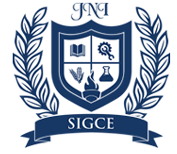Information
Mechanical engineering is known as the evergreen branch among all the other branches of engineering. Traditionally, mechanical engineers have to deal with concepts such as thermodynamics, robotics, kinematics, designing of mechanical elements, fluid mechanics and manufacturing science with their applications in Manufacturing sector, Automotive Sector, Aerospace, Thermal Power Sector, Refrigeration and Air Conditioning Sector.
Through the excellence of its people, the Mechanical Engineering Department of Smt. Indira Gandhi College of Engineering will be recognized as a leader of its discipline in a manner that exemplifies the traditions of learning, discovery, and engagement. The department will be a desirable place to study and work, with our community comprising the best and the brightest, because of educational programs grounded in the mechanical engineering sciences and set within the context of meeting important societal needs. Major subjects include fluid mechanics, thermodynamics & heat transfer, materials engineering, manufacturing, energy systems, dynamics & control, Computer Aided Design (CAD), Computer Integrated Manufacturing (CIM), finite element analysis, mechatronics, robotics and others.
Vision
The Mechanical Engineering Department endeavors to be recognized for outstanding education leading to employable engineers to shoulder the responsibilities of transforming the nation.
Mision
- Create competent Mechanical Engineering graduates by providing excellent infrastructure and facilities.
- Develop industry ready multifaceted graduates by promoting Industry-Institute Relations.
- To provide the students with academic environment of excellence, leadership, ethical guidelines and lifelong learning
PROGRAM EDUCATIONAL OBJECTIVES (PEO)
- PEO-1: To train students with practical skills and experimental practices related to core and applied areas of mechanical engineering.
- PEO-2: To prepare Learner to use modern tools effectively in order to solve real life problems.
- PEO-3: To train the students to analyse the real life problems with industrial visits, vocational trainings, and guest lecturers covering different practical aspects of mechanical engineering.
- PEO- 4: To guide students to conduct themselves in a responsible, professional and ethical manner.
PROGRAM SPECIFIC OBJECTIVES (PSO)
- PSO 1: The student will be able to apply the knowledge of Mathematics, Sciences and engineering fundamentals to formulate, analyse and provide solutions to the problems related to Mechanical engineering.
- PSO 2: The students will be able to successfully apply the principles of design, analysis and implementation of mechanical systems/processes which have been learned as a part of the curriculum.
FUTURE JOB SCOPE OF MECHANICAL ENGINEERING
There is wide scope of job avenues for Mechanical Engineers in India. Few job avenues are highlighted below:
- Aerospace industry – researches, designs, manufactures, operates and maintains aircraft
- Automotive industry – designs, manufactures, distributes and markets motor vehicles
- Thermal plants and gas turbine manufacturers – designs, manufactures, operates and maintains turbines and thermal plants
- Air conditioning and refrigeration industry – researches, designs, manufactures, operates and maintains the air conditioning and refrigeration equipments
- Chemical industry – covers oil companies, chemicals manufacturers and the businesses that support them (e.g. to build new plants or develop new process technologies)
- Defence industry – provides equipment, support and services for the armed forces and national security
- Electronics industry – designs and manufactures components and complete equipment for sectors from automotive to medicine and the military
- Fast moving consumer goods industry – manufactures products such as household cleaning items, personal hygiene goods and convenience foods
- Marine industry – develops and helps operate vessels
- Materials and metals industry – activities include developing new materials and manufacturing components or end products
- Pharmaceuticals industry – develops and manufactures drugs
- Rail industry – designs, constructs, manages and maintains rail system components from trains and tracks to electrical power systems and train control systems
- Utilities industry – helps supply power, water, waste management and telecoms
The department is well established and having well qualified and experienced staff members. Prof. Sardar Vishwadeep S. is the Head of the Department.
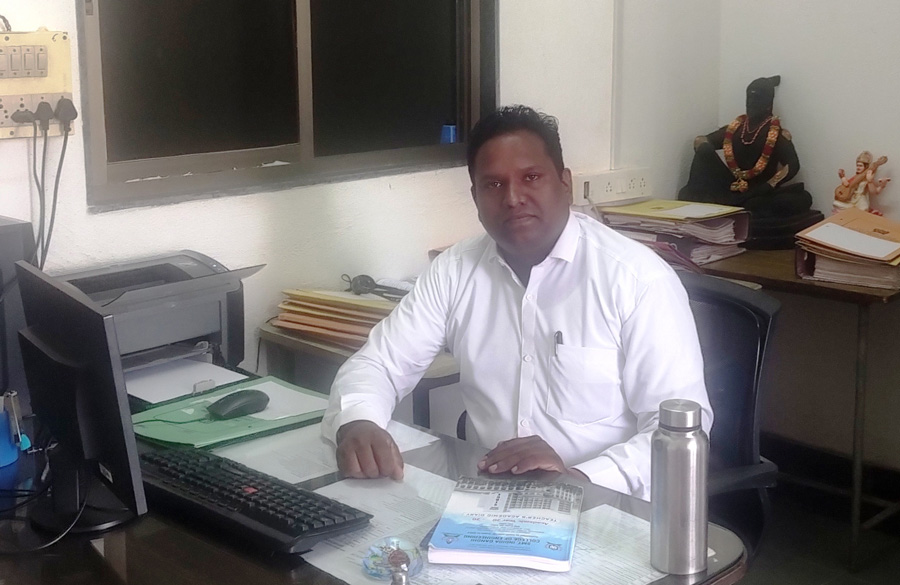
Prof. Sardar Vishwadeep S.
HOD Mechanical Engg.
B.E. (Mech), M.E. (Mechanical Design)
Email: vishwadeep.sardar@sigce.edu.in | hod.mechanical@sigce.edu.in
A hearty welcome to the Department of Mechanical Engineering at Smt. Indira Gandhi College of Engineering, Navi Mumbai.
The department vision is to be excellence in value based Mechanical Engineering Education. The department has well qualified and dedicated faculty. The department strives to impart knowledge and training of the highest standard. The objective of the department is to prepare students for a successful career in Industry, Research and Academics to meet the needs of growing technology. Our efforts are to develop the ability among students to synthesize data and technical concepts for various application and product design. We provide an opportunity for students to work as members of a team on multidisciplinary projects.
Prof. Sardar Vishwadeep .S obtained his Bachelor’s in Mechanical Engineering from the Parshvanath College of Engineering, Thane in 2010 and completed Master’s in Mechanical Engineering from D. Y. Patil Institute of Technology, Savitribai Phule Pune University in 2018. Currently, he is an Assistant Professor and HOD in the Department of Mechanical Engineering. He has 14 years of teaching experience and has many papers in the national and international conferences and journals. He has attended several Short Term Training Programme. He is the life member of the ISTE. He is a Guide, External examiner, Paper Setter at UG level.
Areas of interest: Machine Design, Design of Mechanical Systems, Product Design-Development and Optimization Techniques etc.
Department is conducting Industrial Visits, Value Added Course related to Mechanical Engineering and arranging technical seminars & workshops to upgrade the knowledge of the students and staff.
Department has good co-ordination between staff and students.
Thank you for visit !
COURSES DETAILS A. Y. 2024-25
| Second Year Mechanical Engineering | |||
|---|---|---|---|
| SEM III | SEM IV | ||
| Course Code | Course Name | Course Code | Course Name |
| MEC301 | Engineering Mathematics-III | MEC401 | Engineering Mathematics-IV |
| MEC302 | Strength of Materials | MEC402 | Fluid Mechanics |
| MEC303 | Production Processes | MEC403 | Kinematics of Machinery |
| MEC304 | Materials and Metallurgy | MEC404 | CAD/CAM |
| MEC305 | Thermodynamics | MEC405 | Industrial Electronics |
| MEL301 | Materials Testing | MEL401 | Industrial Electronics |
| MEL302 | Machine Shop Practice | MEL402 | Kinematics of Machinery |
| MESBL301 | CAD –Modeling | MEL403 | Python Programming |
| MEPBL301 | Mini Project – 1A | MESBL401 | CNC and 3-D Printing |
| MEPBL401 | Mini Project – 1B | ||
| Third Year Mechanical Engineering | |||
| SEM V | SEM VI | ||
| Course Code | Course Name | Course Code | Course Name |
| MEC501 | Mechanical Measurements and Controls | MEC601 | Machine Design |
| MEC502 | Thermal Engineering | MEC602 | Turbo Machinery |
| MEC503 | Dynamics of Machinery | MEC603 | Heating, Ventilation, Air conditioning and Refrigeration |
| MEC504 | Finite Element Analysis | MEC604 | Automation and Artificial Intelligence |
| MEDLO501X | Department Level Optional Course – 1 | MEDLO602X | Department Level Optional Course – 2 |
| MEL501 | Thermal Engineering | MEL601 | Machine Design |
| MEL502 | Dynamics of Machinery | MEL602 | Turbo Machinery |
| MESBL501 | Professional communication and ethics –II | MEL603 | Heating, Ventilation, Air conditioning and Refrigeration |
| MEPBL501 | Mini Project – 2 A | MESBL601 | Measurements and Automation |
| MEL503 | Finite Element Analysis | MEPBL601 | Mini Project – 2 B |
| MESBL501 | Professional communication and ethics –II | ||
| Department Level Optional Course – 1 | Department Level Optional Course – 2 | ||
| MEDLO5011 | Optimization Techniques | MEDLO6021 | Press Tool Design |
| MEDLO5012 | Design of Experiments | MEDLO6022 | Tool Engineering |
| MEDLO5013 | Computational Methods | MEDLO6023 | Metal Forming Technology |
| Fourth Year Mechanical Engineering | |||
| SEM VII | SEM VIII | ||
| Course Code | Course Name | Course Code | Course Name |
| MEC701 | Design of Mechanical System | MEC801 | Operations Planning and Control |
| MEC702 | Logistics and Supply Chain Management | MEDLO805X | Department Level Optional Course – 5 |
| MEDLO703X | Department Level Optional Course – 3 | MEDLO806X | Department Level Optional Course – 6 |
| MEILO701X | Institute Level Optional Course – I | MEILO802X | Institute Level Optional Course – 2 |
| MEL701 | Design of Mechanical System | MEL801 | Product Design and Development |
| MEL702 | Maintenance Engineering | MEL802 | Laboratory based on IoT |
| MEL703 | Industrial Skills | MEP801 | Major Project II |
| MEP701 | Major Project I | ||
| Department Level Optional Course | |||
| Course Code | Sem. VII: Department Optional Course- 3 | Course Code | Sem. VIII: Department Optional Course- 5 |
| MEDLO7031 | Automotive Power Systems | MEDLO8051 | Composite Materials |
| MEDLO7032 | Renewable Energy Systems | MEDLO8052 | Smart Materials |
| MEDLO7033 | Vehicle Systems | MEDLO8053 | Micro Electro Mechanical Systems |
| Course Code | Sem. VII: Department Optional Course – 4 | Course Code | Sem. VIII: Department Optional Course – 6 |
| MEDLO7041 | Machinery Diagnostics | MEDLO8061 | Product Design and Development |
| MEDLO7042 | Vibration Controls | MEDLO8062 | Design for X |
| MEDLO7043 | Advanced Vibration | MEDLO8063 | Total Quality Mana |
| Course Code | Institute Level Optional Course – I | Course Code | Institute Level Optional Course – 2 |
| ILO7011 | Product Lifecycle Management | ILO8021 | Project Management |
| ILO7012 | Reliability Engineering | ILO8022 | Finance Management |
| ILO7013 | Management Information System | ILO8023 | Entrepreneurship Development and Management |
| ILO7014 | Design of Experiments | ILO8024 | Human Resource Management |
| ILO7015 | Operation Research | ILO8025 | Professional Ethics and CSR |
| ILO7016 | Cyber Security and Laws | ILO8026 | Research Methodology |
| ILO7017 | Disaster Management and Mitigation Measures | ILO8027 | IPR and Patenting |
| ILO7018 | Energy Audit and Management | ILO8028 | Digital Business Management |
| ILO7019 | Development Engineering | ILO8029 | Environmental Management |
Strength of materials laboratory is well equipped with destructive testing machineries. This lab course is offered in the second year for the students from mechanical engineering. Students will be able to understand the theoretical concepts of solid mechanics course and enable them to apply it practically in this lab. Different types of tests are being conducted in this laboratory to know the various mechanical properties of a material such as young’s modulus, shear modulus, hardness, toughness, deflection, torsion test etc.
A Unique feature of this lab is the “Universal Testing Machine (UTM)”. 60 ton capacity the machines is integrated with the computer.

Charpy and Izod Impact Testing Machine

Torsion Test Machine

Universal Testing Machine
Lab Name:- Material Technology Laboratory
The Material Technology Laboratory consists of various ferrous and non-ferrous specimens, specimen preparation machines, like Disc polishing machine, Abrasive belt machine etc. material microstructure analysis using microscopes and material testing equipments like hardness, hardenability (Jominey end quench) and heat treatment using Muffle furnaces. The students understand their theoretical knowledge of Materials Technology. The students are encouraged to prepare the specimen material and study the microstructure.

Metallurgical Microscope

Rockwell Hardness Tester

Jominy-end Quench Test Apparatus
Lab Name:- Fluid Mechanics Laboratory
The fluid mechanics range offers a wide scope of teaching equipment for the delivery of complete courses in fluid dynamics.
In many settings, the modular Hydraulic Bench acts as a base unit, allowing tutors to swap out individually mounted experiment modules on these self-contained benches, reducing lab set-up time, lab space requirements, and cost.
Within the fluid mechanics range there is equipment for demonstrating Bernoulli’s theorem, orifice meter, pressure and flow measurement, pipe friction and energy loss, and much more.

Losses in Pipe apparatus

Venturi Meter And Orifice Meter Apparatus

Verification of Bernoulli’s Theorem
Lab Name:- Fluid Mechanics Laboratory
A well-equipped computer lab with advanced facilities is established for the benefit of the Mechanical engineering students. High end terminals supported by latest hardware and software. Advanced Mechanical Engineering software are procured for making the students globally competitive and industry ready. AutoCAD lab, students get professional training on 2D & 3D drafting of Mechanical engineering drawings using the latest version of AutoCAD software and SOLIDWORK software. Student will learn computer aided design layout and 3D solid modeling.

Auto CAD Drawings

SOLIDWORK Screen (assembly of Engine parts)
Lab Name:- Industrial Electronics Laboratory
Industrial Electronics is one of the course for SE Mechanical Engineering. The Industrial electronics lab consists of all essential equipments like Bread board system, DSO, CRO, function generator, power electronics kits, digital logic trainer kits, OPAMP based kits ,which are used by the students to enhance the knowledge of basic electronics and prepare them to work in the development, installation, testing, maintenance and repair of electrical and electronics systems.

Digital Logic Trainer kit

Opamp Circuit Trainer kit

CRO
Machine Shop
A machine shop is a facility with equipment and supplies for machining, a process where parts are cut, fabricated, and finished to prepare them for use. Machine shops are used in the creation of new parts, as well as repairs of existing equipment and parts. Their personnel may have specialized training, depending on the type of work done at the shop, as some machining tasks require a unique skill set, as well as a deep understanding of the kind of work the finished parts will be used for.
Machine shop is spacious, well developed typically consists of the following types of equipments.
- Metal lathe machine
- Milling machine
- Shaping Machine
- Grinding machine
- Drilling machines
- Welding machines
- Inspection equipments
- Welding machines
- Wood turning machines
- Power saw
- Cutting tools etc.


SOLIDWORKS
The Value Added Education Courses aim to provide additional learner centric graded skill oriented technical training, with the primary objective of improving the employability skills of students.
The main objectives of the program are:
- To provide students an understanding of the expectations of industry.
- To improve employability skills of students.
- To bridge the skill gaps and make students industry ready.
- To provide an opportunity to students to develop inter-disciplinary skills.
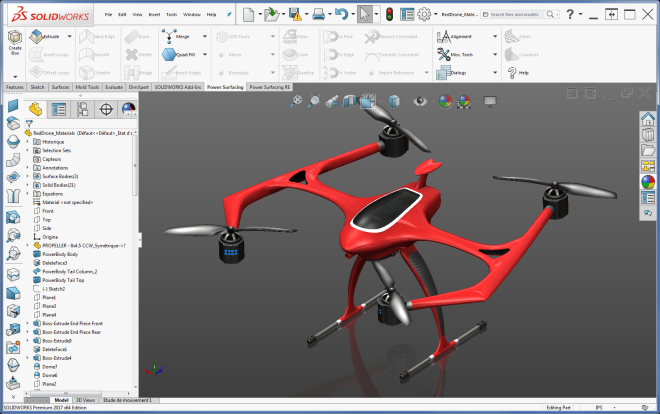
Modeling in SOLIDWORKS and Simulation in ANSYS
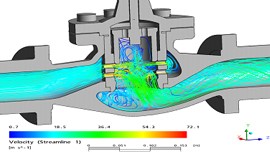
| Date | Description | Link |
|---|---|---|
| 28/02/2025 | Industrial Visit Report to Mayur Agrofesh,Mahape,Navi mumbai.Subject- HVACR | Click Here |
| 13/01/2025 to 17/01/2025 | Value Added Course on “CNC Machine and Programming” | Click Here |
| 14/10/2024 | Awareness session on “Careers in Defence as a Commissioned Officer” | Click Here |
| 1/10/2024 | Workshop on “Materials and its Failure” | Click Here |
| 26/09/2024 | AutoCAD Master’s Challenge event September | Click Here |
| 16/4/2024 | Seminar on “Career and Innovation in Manufacturing Industries” | Click Here |
| 11/3/2024 | AutoCAD Master’s Challenge event March | Click Here |
| 12/2/2024 | Workshop on “Solidworks Simulation & ANSYS Software” | Click Here |
| 16/10/2023 | Expert lecture on Bode Plot | Click Here |
| 31/08/2023 | Seminar on “How to Write and Publish Research Paper?” | Click Here |
| 15/09/2022 | Seminar on Mechanical CAD software | Click Here |
| 05/09/2020 | Webinar on “Computer aided styling for automotive designer”- 5th Sept 2020″ | Click Here |
| 06/08/2020 | Webinar on ” How to prepare and why to prepare for compatitive exam” | Click Here |
| 09/07/2020 | Webinar: ISHRAE Orientation program and Career Opportunities in HVAC & R Industry | Click Here |
A webinar on Designing for people
Date:- 07/07/2020 Time:-11 AM
ISHRAE Orientation program and Scenario of HVAC industries post Covid-19
Date:- 28/06/2020 Time:-10 AM
Information Platform : Cisco WebEx Reported by : SIGCE’S ISHRAE CLUB Date: 28th of June, 2020 A webinar was held on ISHRAE Orientation Program and Scenario of HVAC industries post Covid-19 leaded by the speaker Mr. Parth Thakkar, Director at Polfrost Aircon Pvt. Ltd. organised by the ISHRAE club of the SIGCE, for all the students of the mechanical and electrical branch of SIGCE on 28th of June, 2020 on the Cisco WebEx platform. The webinar was organised for the students to get the information about ISHRAE and benefits to join ISHRAE. The event started with the introduction of the speaker to the students and with the greetings from the MESA Convenor and HOD Dr. Dhanawade H S. sir. Then the speaker gave a lot of information about ISHRAE and the changes in the field of Heating, ventilation, and air conditioning (HVAC). The speaker acknowledged the different aspects and how it is useful and works with hands in hands along with the engineering. The audience got a brief idea about ISHRAE and various information including all the aspects of how it will affect the engineering and technology sector. Later there were some questions raised by the students which were answered by the speaker. Speaker too inspired the students through his journey, how to proceed and give an approach. The webinar was very interactive from both ends. Students got useful information about the topic and the response was overwhelming from students’ side too. Here are some of the glimpses from webinar
WORKSHOP ON 3D PRINTING
Date:- 28/09/2018 Time:-10am to 12.30 pm amd 1.30 to 4pm
Students understood the concept of 3D Printer Application in Mechanical Engineering at primary level.
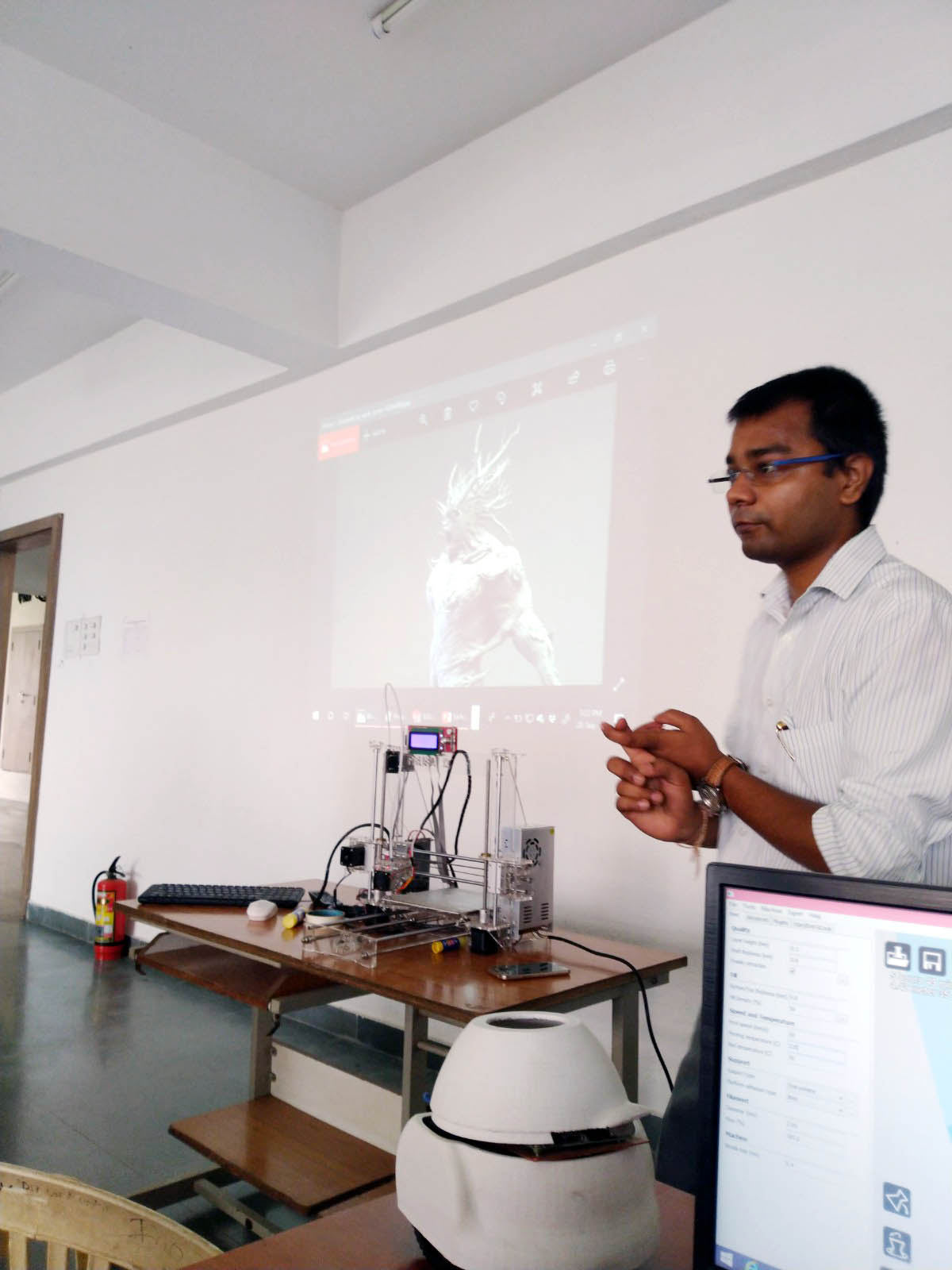
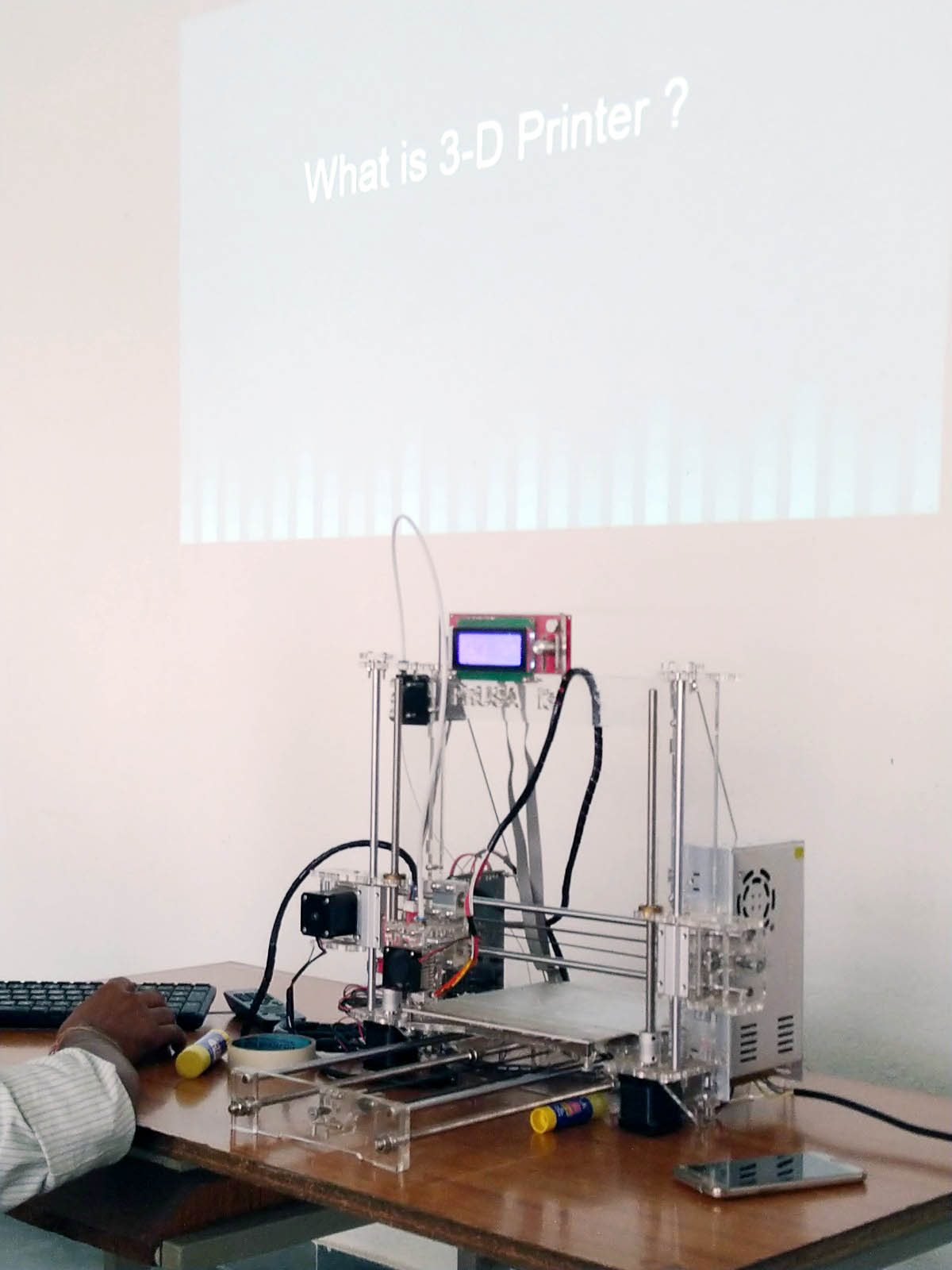
WORKSHOP ON AUTO CAD SOFTWARE TRAINING
Date:- 04/10/2018 and 5/10/2018 Time:-9.30 am to 12.30 pm and 1 pm to 4.30pm both days
Students understood basic commands and attempted successful drawing in AutoCAD.
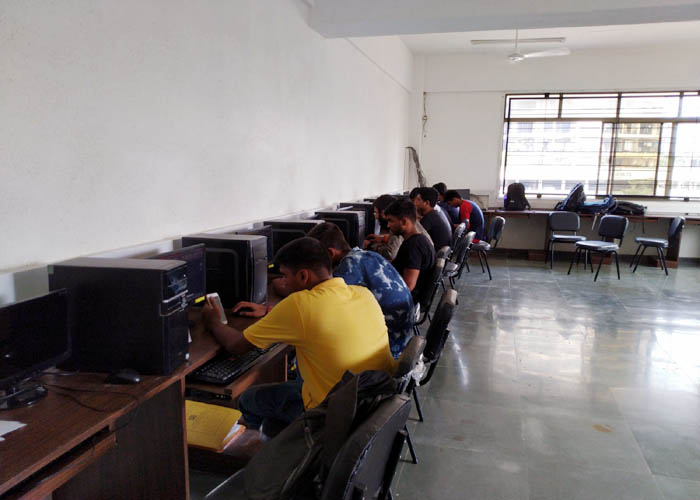
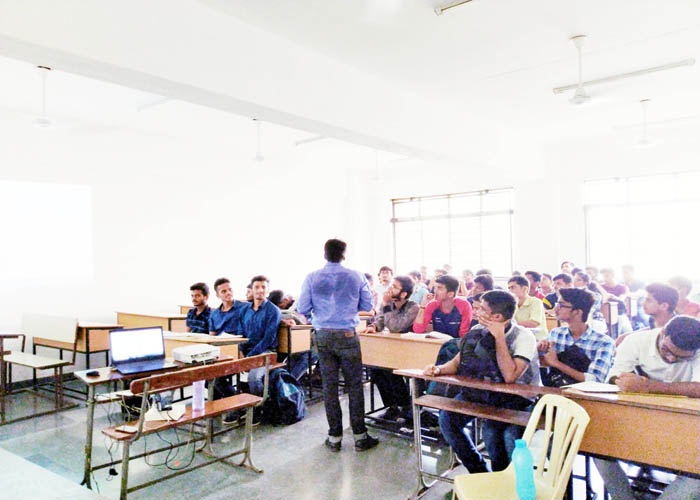
Seminar on ‘overview of HVAC Industries’ in association with ISHARE Mumbai Chapter
Date:- 21 February 2019 Time:- 8.30am to 10.30 am
Students got basic knowledge of ISHRE and Contribution of ISHRE to Human enhancing technology
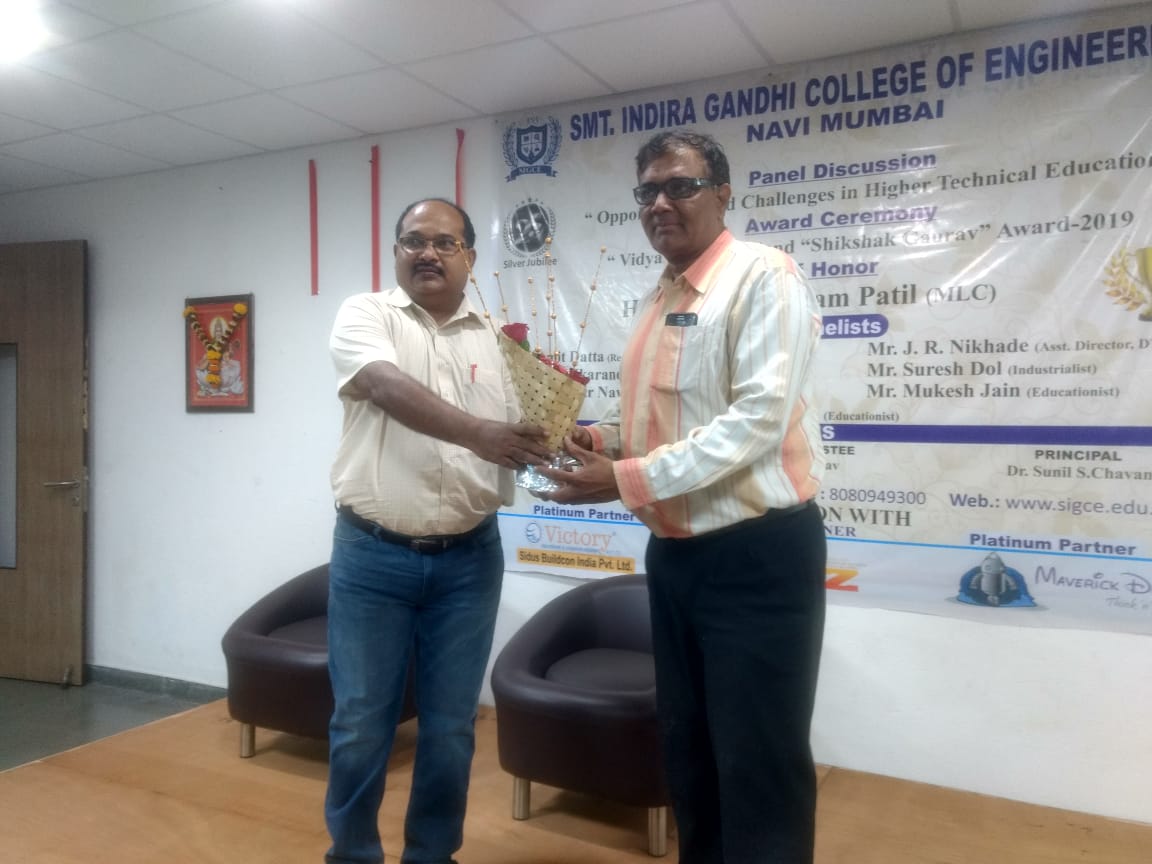
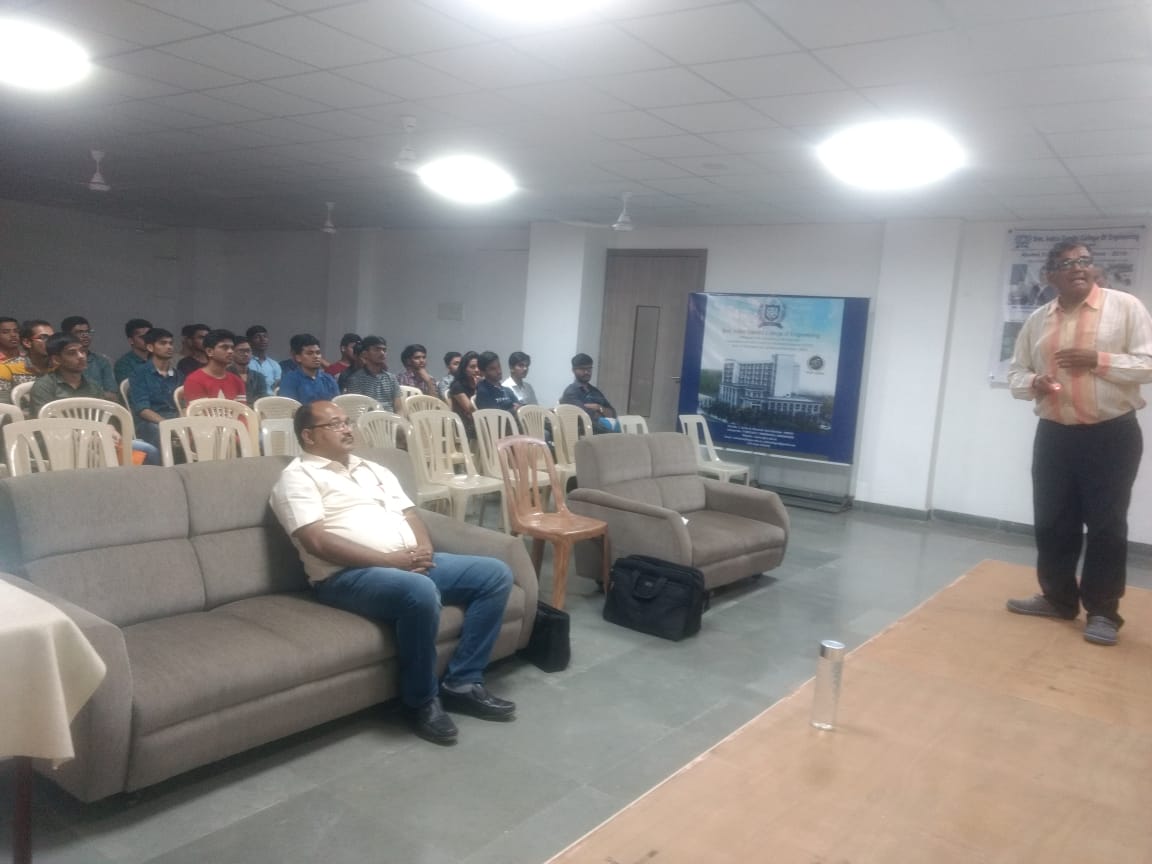
Work Shop On Solid works, Pro E, CATIA in association with Institute of Engineers (India)
Date:- 29 March 2019 Time:- 10am to 12.30 pm
Students got introduced with various Software used for 3D Modeling.
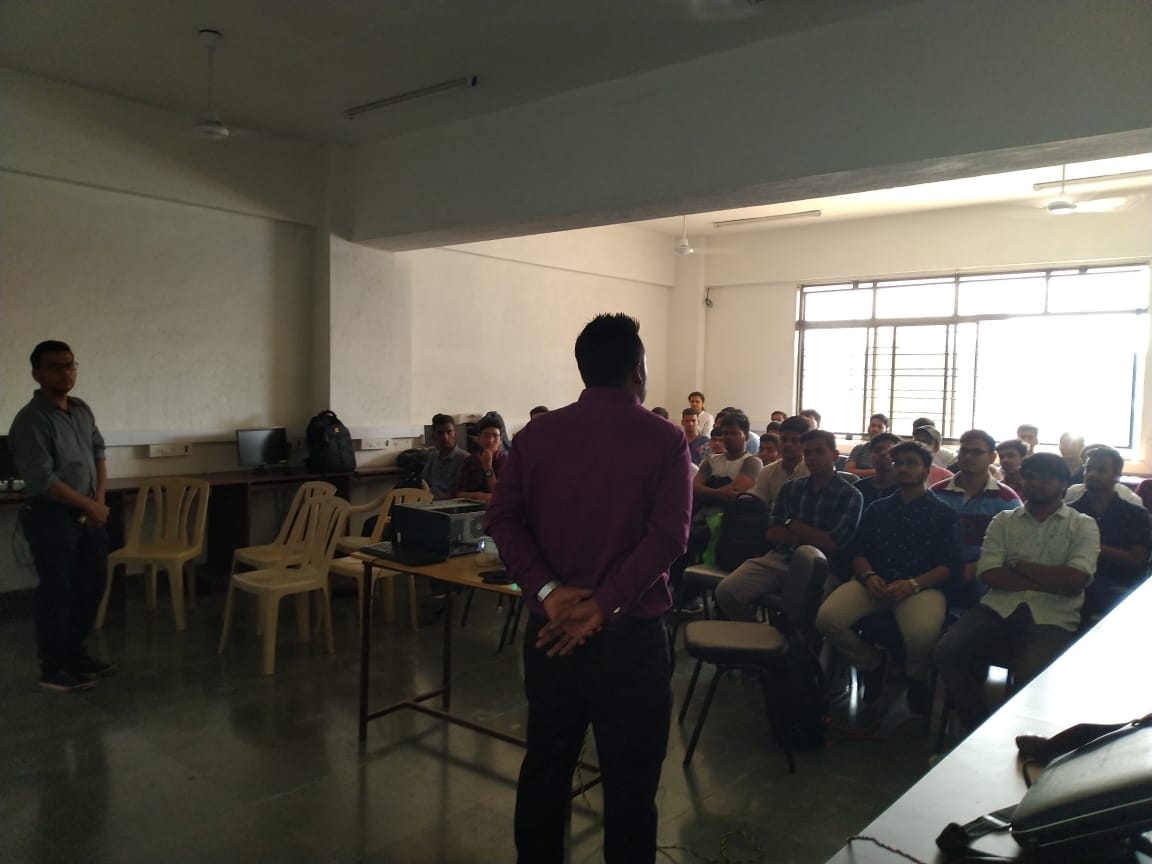
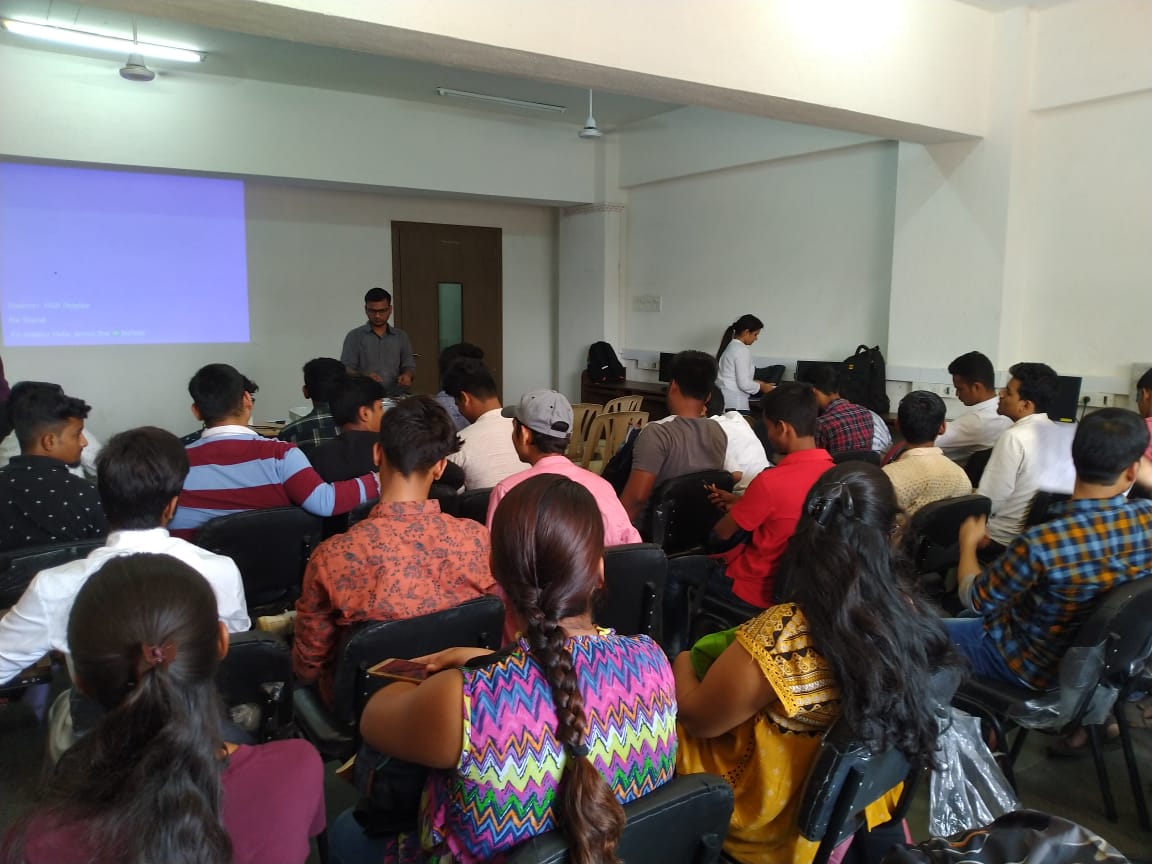
| Date | Notice Descritpion | link |
|---|---|---|
| 21/02/2025 | Internal Assesment – I | Click Here |
| 18/03/2025 | Mini Project PRP-II | Click Here |
| 13/03/2025 | KT Internal Assesment | Click Here |
| Group No. | Title of the Project |
|---|---|
| 1 | Solar Lamp with Automatic ON-OFF System |
| 2 | Generation Of Electricity using Power Lift |
| 3 | EV Operated Scooter |
| 5 | Manual Operated Pedal Water boat for Garbage collection from Pond |
| 6 | Filterless Air Purifier |
| 7 | Single wheel skate board using Gearless Mechanism |
| Second Year Mechanical Engineering | ||||
|---|---|---|---|---|
| Course Code | Course Name | Name of Fauculty | Link of Google Classroom | Google Classroom Code |
| MEC301 | Engineering Mathematics-III | Prof.Dipika P.Wagh | https://classroom.google.com/c/NjkxNjUwNTgzNzE3?cjc=r2thr3d | r2thr3d |
| MEC302 | Strength of Materials | Prof. Rehan Khan | https://classroom.google.com/c/NzE4NDg2MDk0ODU0?cjc=zlfcvo2 | zlfcvo2 |
| MEC303 | Production Processes | Prof .Vaishali Misal | https://classroom.google.com/c/NzAyMDA3MDQ4NjIw?cjc=wns6ala | wns6ala |
| MEC304 | Materials and Metallurgy | Prof.Kishor Chandgude | https://classroom.google.com/c/NzE4NjUwOTM0ODA0?cjc=32iljti | 32iljti |
| MEC305 | Thermodynamics | Prof Vivekanand K | https://classroom.google.com/c/NzAyMjc5MzgyODIz?cjc=uozmsdy | uozmsdy |
| MEC401 | Engineering Mathematics-IV | Prof.Dipika P.Wagh | https://classroom.google.com/c/NzQzNjQ1MDk5NzUx?cjc=dd2zt3l | dd2zt3l |
| MEC402 | Fluid Mechanics | Prof Vivekanand K | https://classroom.google.com/c/NzQ0MzAzOTQ2ODEz | tci34ag |
| MEC403 | Kinematics of Machinery | Prof.Kishor Chandgude | https://classroom.google.com/c/NzMzNjAxNzA4NjI0?cjc=swj4va2 | swj4va2 |
| MEC404 | CAD/CAM | Prof. Rehan Khan | https://classroom.google.com/c/NzM2Nzg2MjMyNjE1?cjc=tl2jbeb | tl2jbeb |
| MEC405 | Industrial Electronics | Prof. Satish Nimbalkar | https://classroom.google.com/c/NzI1NTYzOTk0MDI4?cjc=svb2gns | svb2gns |
| Third Year Mechanical Engineering | ||||
| Course Code | Course Name | Name of Fauculty | Link of Google Classroom | Google Classroom Code |
| MEC501 | Mechanical Measurements and Controls | Prof. Satish Nimbalkar | https://classroom.google.com/c/NzAxNjc3MjQxNDQw?cjc=kg6ecap | kg6ecap |
| MEC502 | Thermal Engineering | Prof Vivekanand K | https://classroom.google.com/c/NzAyMTQ0OTY3NjI0?cjc=ickbfav | ickbfav |
| MEC503 | Dynamics of Machinery | Prof.Kishor Chandgude | https://classroom.google.com/c/NzE0MzY5NjUxNjYy?cjc=zobr4vh | zobr4vh |
| MEC504 | Finite Element Analysis | Prof .Vaishali Misal | https://classroom.google.com/c/NzAyMTUxOTI2NTc5?cjc=cyxwabo | cyxwabo |
| MEDLO5011 | Optimization Techniques | Dr. Uday Gudsoorkar | https://classroom.google.com/c/NzAxODU5OTM2NzE0?cjc=xtkzrm7 | xtkzrm7 |
| MEC601 | Machine Design | Prof. Vishwadeep Sardar | https://classroom.google.com/c/NzM2NjAxNTc2MzMx?cjc=wcn3x7l | wcn3x7l |
| MEC602 | Turbo Machinery | Prof. Mahendra Baban Bhoir | https://classroom.google.com/c/NzM2NTkxODM2NDg3?cjc=fea42u3 | fea42u3 |
| MEC603 | Heating, Ventilation, Air conditioning and Refrigeration | Prof Vivekanand K | https://classroom.google.com/c/NzQzNjIyMDc4MDAw?cjc=huaobjl | huaobjl |
| MEC604 | Automation and Artificial Intelligence | Prof. Rehan Khan | https://classroom.google.com/c/NzM2Nzg2NDY3MDc0?cjc=d2ezjib | d2ezjib |
| MEDLO6023 | Metal Forming Technology | Dr. Uday Gudsoorkar | https://classroom.google.com/c/NzQ4ODY3NDk2Nzc0?cjc=54ahptk | 54ahptk |
| MESBL501 | Professional communication and ethics –II | |||
| Fourth Year Mechanical Engineering | ||||
| Course Code | Course Name | Name of Fauculty | Link of Google Classroom | Google Classroom Code |
| MEC701 | Design of Mechanical System | Prof. Vishwadeep Sardar | https://classroom.google.com/c/NzAxNzQwMzQyNTA0?cjc=znoyt3c | znoyt3c |
| MEC702 | Logistics and Supply Chain Management | Dr. Uday Gudsoorkar | https://classroom.google.com/c/NzAxODYyNTI1MDIz?cjc=th6m4ad | th6m4ad |
| MEDLO7032 | Renewable Energy Systems | Prof .Vaishali Misal | ||
| MEDLO7041 | Machinery Diagnostics | Prof. Rehan Khan | https://classroom.google.com/c/NzA1NDEyNjkyMzg4?cjc=hm5255u | hm5255u |
| MEL703 | Industrial Skill | Prof Vivekanand K | https://classroom.google.com/c/NzAyMTI5MjYwMTgx?cjc=eubm6ui | eubm6ui |
| MEC801 | Operations Planning and Control | Dr. Uday Gudsoorkar | https://classroom.google.com/c/NzQ5NTkyODAxNDQ4?cjc=pts2w7d | pts2w7d |
| MEDLO8051 | Composite Materials | Prof. Vishwadeep Sardar | https://classroom.google.com/c/NzQ3NjExOTA1MDM3?cjc=bihqpbb | bihqpbb |
| MEDLO8061 | Product Design and Development | Prof. Kishor Chandgude | https://classroom.google.com/c/NzQ2MDUwOTg4MTcw?cjc=u374rql | u374rql |
| ILO8021 | Project Management | Prof. Satish Nimbalkar | https://classroom.google.com/c/NzQ3MDI1NDM4MzM3?cjc=ddkob5m | ddkob5m |
